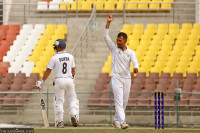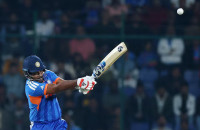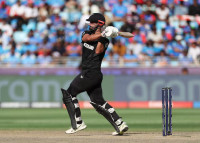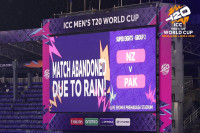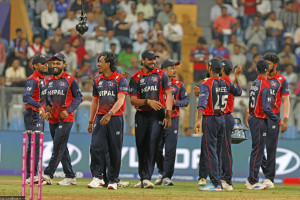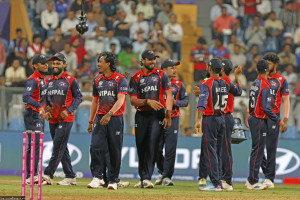Cricket
Nepal’s 12th man: Diaspora fans power the Rhinos in Scotland
From an 89-year-old conch-blower to night-driving diehards, Nepali supporters turned Dundee into a home ground, proving that, for the Rhinos, home is where the fans are..jpg&w=900&height=601)
Binod Pandey
Nepal concluded their ICC CWC League 2 tri-series against the Netherlands and host Scotland on Tuesday with three wins in four games. And the cricketers were not shy to accept that the fans—Nepal’s 12th man—made the wins possible.
Despite playing in the Scottish heartland, the Rhinos were buoyed by the unmatched energy that Nepal supporters injected into the games. But these weren’t fans flown in from Kathmandu. They were members of the Nepali diaspora, living in the UK and Ireland—from London and Liverpool to Glasgow, Aberdeen and Edinburgh—who filled the modest ground of Forfarshire Cricket Club in Forthill, Dundee.
With just 1,000 tickets on offer due to the lack of proper seating, fans were handed plastic chairs and seated around the boundary. And among them, one familiar figure stood out at every match—89-year-old Madhusudhan Bhattarai.
A resident of Arbroath, 15 miles from Forthill, Bhattarai showed up for each Nepal match donning a traditional dhaka topi, buying his £20 ticket, carrying his chair, and cheering tirelessly for the team through games that stretched over eight hours.
Franchise cricket is booming across the world with cheerleaders and flashy entertainment. But in Forthill, Bhattarai became a different kind of attraction during Nepal’s matches.
Every time a Nepali batter hit a boundary or six, or a bowler claimed a wicket, Bhattarai would blow a conch shell—his unique way of lifting the team’s spirits. If you were not completely invested in the game, the sound of his shell would tell you Nepal had just struck gold.
Further, Bhattarai was also there to cheer for Nepal when the Rhinos faced the A team of Scotland for a two-match one-day series before the League 2.
And accompanied by the sound of his shell and other musical instruments, Nepali supporters beamed with growing pride. The environment provided warmth to the players who travelled to the chill of Scotland from the sunny days in Kathmandu.
Binod Bikas Simkhada, based in London, was part of a 10-member group that travelled to Dundee to watch the League 2 matches. “Most travelled from outside Dundee—some even drove through the night just to be here for the morning matches. That shows how deeply they care,” Simkhada told the Post. “Having the Nepali team play nearby gave us a perfect reason to reconnect with home through cricket. Usually, we have to travel far to see Nepal play. This time, they came closer to us.”
He added, “It doesn’t feel like an away match when Nepal plays abroad. The crowd makes it feel like they’re playing at home. We are proud to be those motivators this time.”
Similarly, Bishal Gautam, who moved to London two years ago, said he never missed a cricket match of the national team when he was back home. “I have lamented the inability to watch the national team perform since I came to the UK,” Gautam said. “This was the first time I watched them play overseas. That the team played really well was a cherry on top.”
Around 700 to 800 spectators attended the matches on June 2 and 8— the majority of them Nepali fans.
“I found a special vibe seeing our national team on foreign soil,” Gautam added. “We have college, work, and everyday stress to manage. But watching Nepal play made us forget it all.”
Fans had been enjoying the matches from the open ground without much restriction. But after Nepal’s thrilling chase of 297 runs against Scotland in their opening match, excitement spilt over as supporters stormed the field to lift hero Karan KC onto their shoulders.
“Scotland's one-day cricket match against Nepal in Dundee perhaps wasn’t the sporting event where you’d have expected crowd trouble,” British tabloid Daily Mail reported after Nepal’s victory. “That dramatic win led to a pitch invasion from the Nepalese fans—there were more there than you would have thought—with the victorious players having to be escorted from the field by stewards in the aftermath.”
In a video of cheering Nepali fans posted by Cricket Scotland on its Facebook, Alan Cunningham, a Scottish national, commented: “Made me laugh. Usually stewarding at a Scotland cricket match is easy money. You might have to walk round at the end of the game and wake up a few of us old guys but not much else. The stewards today really earned their wages. Some game, some finish.”
Meanwhile, in response to the invasion on the first day, the Cricket Association of Nepal and Cricket Scotland issued a joint appeal urging fans not to enter the field for the remaining fixtures. Entering the playing area is considered a breach of conduct, and after that match, barriers were installed around the boundary to prevent further invasions.
It appears that Cricket Scotland will require more preparation when the Rhinos march through Glasgow for a T20I tri-series comprising Scotland and the Netherlands from June 15.
Sagar Bhandari, who has been in the restaurant business in the area for 17 years, expects an even bigger turnout when Nepal play in Glasgow.
Nepal’s first match of the T20I tri-series is against the Dutch side on June 16. Nepal face the hosts for the first of the two fixtures in the double round-robin tournament on June 17.
“Dundee is a bit remote, but Glasgow has a large Nepali community,” he explains. “Most of them work in restaurants. Since weekends are busy and Mondays are usually off, we’re expecting a huge crowd for that first match in Glasgow.”
Sheela Tripathee
Research Fellow, Health Sciences, University of Aberdeen
For Nepalis living abroad, we often seek reasons to feel close to home, whether through festivals, films, or visits by artistes. Now Nepali cricket has become one of those powerful reasons.
When the national team arrived in Scotland, it wasn’t just about the sport. For many, it felt bigger than a festival. Cricket brought together communities from Glasgow, Edinburgh, Aberdeen, and beyond. Dundee, a small city, had never seen such a large Nepali gathering. While our Nepal–Scotland Friendship Forum usually has 150–200 members, over 500 Nepalis showed up for the matches.

Even those who’ve never followed cricket are connected with the team through pride and national identity. The team’s strong performance made the experience even more meaningful. People followed the games from the warm-up matches onward, cheering not just for cricket, but for a piece of home.
Before this, cricket was hardly discussed in our community. Most didn’t even know Dundee had a cricket ground. Now, it’s become a common topic—something that even the next generation born in Scotland can relate to.
Nepali cricket, simply put, has given the diaspora a new way to feel rooted in their identity.




 9.83°C Kathmandu
9.83°C Kathmandu
